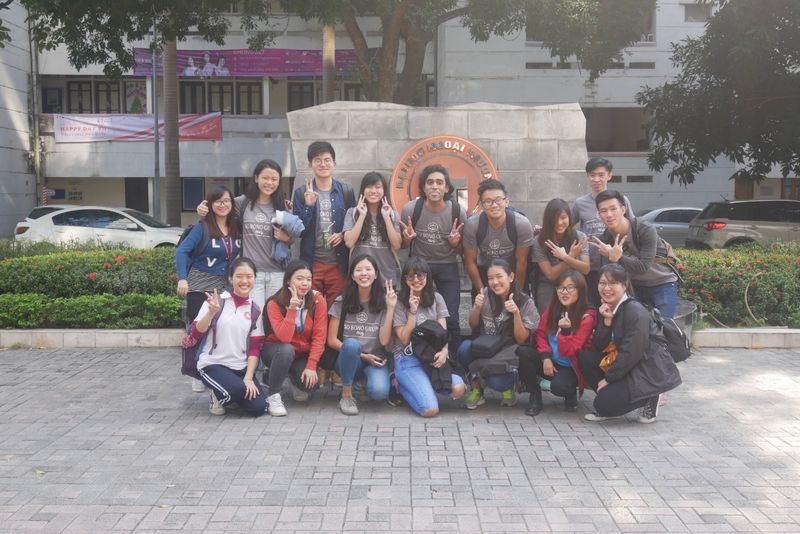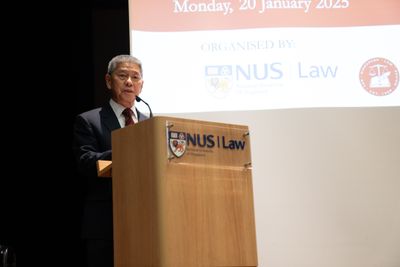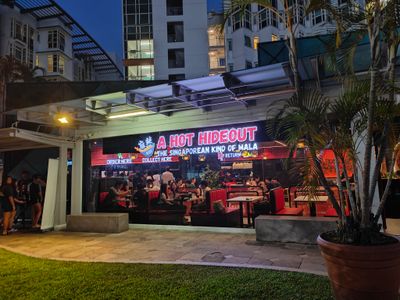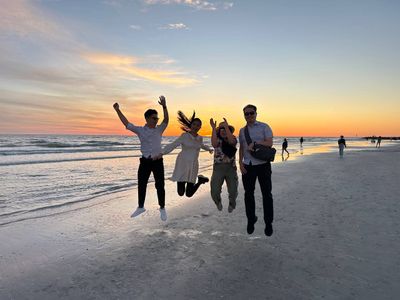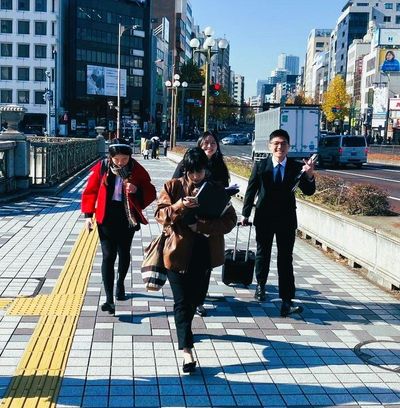From 3 to 9 December 2017, the NUS Pro Bono Group (“PBG”) participated in an inaugural exchange in Hanoi, Vietnam. The Vietnamese universities participating included the Foreign Trade University (“FTU”), Hanoi Law University (“HLU”) and National Economics University (“NEU”).
The team had three goals in mind:
(1) to share PBG’s projects and examples of NUS Law’s student-driven pro bono culture, to act as a comparison to the Vietnamese universities’ model of clinical legal education (“CLE”) where community-based initiatives are held by the universities to educate people on their legal rights;
(2) to encourage the Vietnamese students to start their own projects; and
(3) to learn about the different legal issues prevalent in Vietnam.
This article will provide a snapshot of the trip’s highlights as well as the PBG team’s key takeaways.
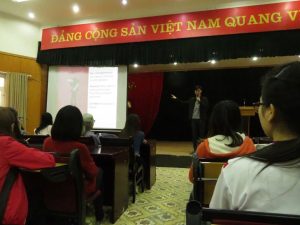
PBG president Jonathan speaking to the Vietnamese students
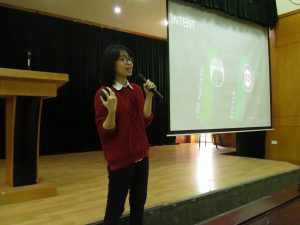
Presentation by a student representative of the FTU CLE
Day 1: The Game of Life
The “Game of Life” was a masterful in-house creation put together by members of the PBG team, and was truly a fitting start to our week’s programme. Featuring mini-games that simulated various stages of childhood and adulthood, participants competed to out-think and out-last one another to clinch tokens symbolizing their “standing” in life. The catch: we had rigged the game in favour of specific players.
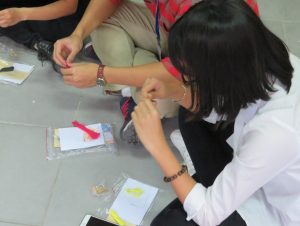
Students sculpting what ‘privilege’ means to them
Through its many stages, the Game of Life sought to communicate the idea of privilege, its various manifestations and how these hidden barriers often prevent the disadvantaged in society from accessing legal services. By bridging the concepts of privilege and access to justice, the Game of Life laid the groundwork for us to broach substantive issues regarding access to justice viz its constitutional, legislative and governmental recognition.
The overarching theme of ‘access to justice’ was a useful primer for us to explore the balance between governmental legal aid and pro bono publico work, as well as to highlight the inestimable value of student pro bono work in helping disadvantaged persons learn about and exercise their individual rights.
Day 2: “How to build your own project”
One could say that the raison d’être for the exchange was our sharing on “How to build a project”. This was a key forum for the Vietnamese students to think about and discuss socio-legal issues that they wished to pursue as formal projects. It was also a valuable opportunity for the students to explore the possibility of inter-university projects.
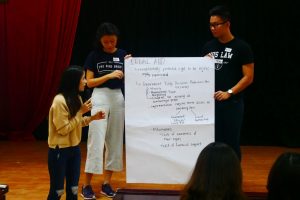
Presenting on the group’s discussion on the types of legal aid available in Vietnam
A recurring topic of interest was the protection of women’s rights among ethnic minorities. There was a general consensus regarding the need to reach out to communities isolated in rural areas, as well as a strong interest in organising village-stays for the Law students to immerse themselves in the culture of the beneficiaries’ community. This would allow the students to identify legal issues affecting these rural communities, such as the prevalence of domestic violence and underage marriage, and tailor their outreach to address these needs.
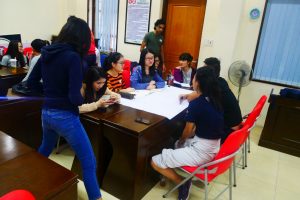
Group discussion on project ideas
Witnessing the diverse legal issues affecting the various communities in Vietnam was a timely reminder that there are always disadvantaged communities that had much to gain from pro bono work. This has inspired us to constantly re-evaluate our projects in order to stay relevant to the changing needs of our beneficiaries.
Day 3: Visit to the Action to the Community Development Centre and NHQuang & Associates
The PBG team, together with students from FTU, were hosted by the Action to the Community Development Centre (“ACDC”), a non-governmental organization (“NGO”) providing legal services to people with disabilities, as well as a NHQuang & Associates (“NHQuang”), a public interest law firm in Vietnam. These visits offered us rare insights from respected actors at the forefront of the Vietnamese pro bono scene. At the same time, it was a chance for our Vietnamese counterparts to network with potential partners regarding future collaborations on new projects.
ACDC inspired many with its mission to give life to a disabled person’s right to access to justice, as enshrined in Article 13 of the United Nations’ Convention on the Rights of Persons with Disabilities (“CRPD”). Key pillars of their outreach include guiding disabled persons through their applications for government aid, and a “telephone counselling” programme to provide of legal advice on a range of matters such as employment and housing.
The ACDC also boasts a track record of successfully advocating for legislative changes that enhanced protections for disabled persons. We were heartened by the receptivity of the government to engaging NGOs in consultation exercises in the run-up to legislative change, and were convinced that the conditions in Hanoi were ripe for student-led pro bono initiatives.
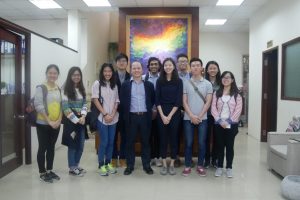
Visit to NHQuang & Associates
NHQuang & Associates also has a unique mission to champion pro bono legal assistance in Vietnam. Among its many beneficiaries, the firm supports small and medium enterprises (SMEs) and social enterprises, including farmers looking to start a business or villages seeking to break into steel production. The firm is also active in policy advocacy ranging from national issues to the regulation of the legal profession.
Mr. Nguyen Hung Quang, the founder of NHQuang, shared his views on the legal aid scheme in Vietnam providing representation to accused persons being tried for capital offences. He believes that the token honorarium of USD$21 per day was affecting the quality of legal assistance provided, and has thus been campaigning to increase remuneration so as to attract the best talents into the scheme. This led us to reflect on the challenges inherent in Singapore’s own model of criminal legal aid and the need to uphold professional standards, especially when engaging in pro bono.
We were also struck by NHQuang’s commitment to improving the pro bono scene and wider national legal system. Besides travelling to other countries to conduct comparative studies, the firm was also in the midst of a 10-year petition effort for an e-litigation system in civil matters, so as to boost transparency by increasing access to judicial decisions.
Day 4: Visit to Tien Xuan Secondary School
We were privileged to attend a legal awareness workshop organized by our hosts from FTU CLE. The workshop, held at Tien Xuan Secondary School, aimed to educate the ethnic minority students about their rights under Vietnam’s child labour laws through various interactive activities. The PBG team also delivered a brief presentation on protection for child labourers under Singapore’s employment law.
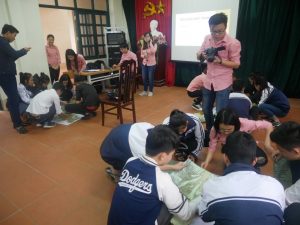
Conducting interactive puzzle games for the students
Day 5: Action plans
The final act of our week’s exchange programme was a brainstorming session with our Vietnamese counterparts. Based on the legal issues we identified, we hammered out action plans, set out timelines to track the development of their projects, and made a commitment to each other to check in periodically on the progress. We hope to see the fruition of their projects in the near future!
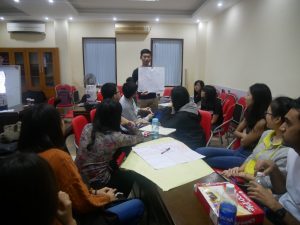
Sharing of project ideas by the students
Conclusion
It is always a happy occasion when the NUS PBG gets the chance to discuss and explore the potential for student pro bono with foreign universities. Beyond encouraging our Vietnamese counterparts to start their own projects, we hope that this exchange will yield future collaborative projects on issues that transcend borders. The trip has also led us to appreciate the strong bottom-up pro bono culture in NUS Law that enables our students to initiate and develop their own projects. We hope to steward this proud tradition and inspire NUS Law students to participate actively in pro bono work.
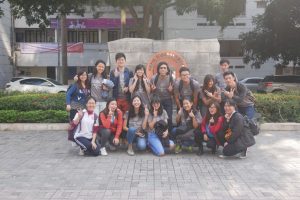
Finally, we would like to thank the faculty and students from FTU, NEU and HLU who have been such gracious hosts throughout our stay in Hanoi. It was an incredible learning experience for the PBG team, and we are excited to see how our Vietnamese counterparts will continue impacting the pro bono scene in Vietnam.


